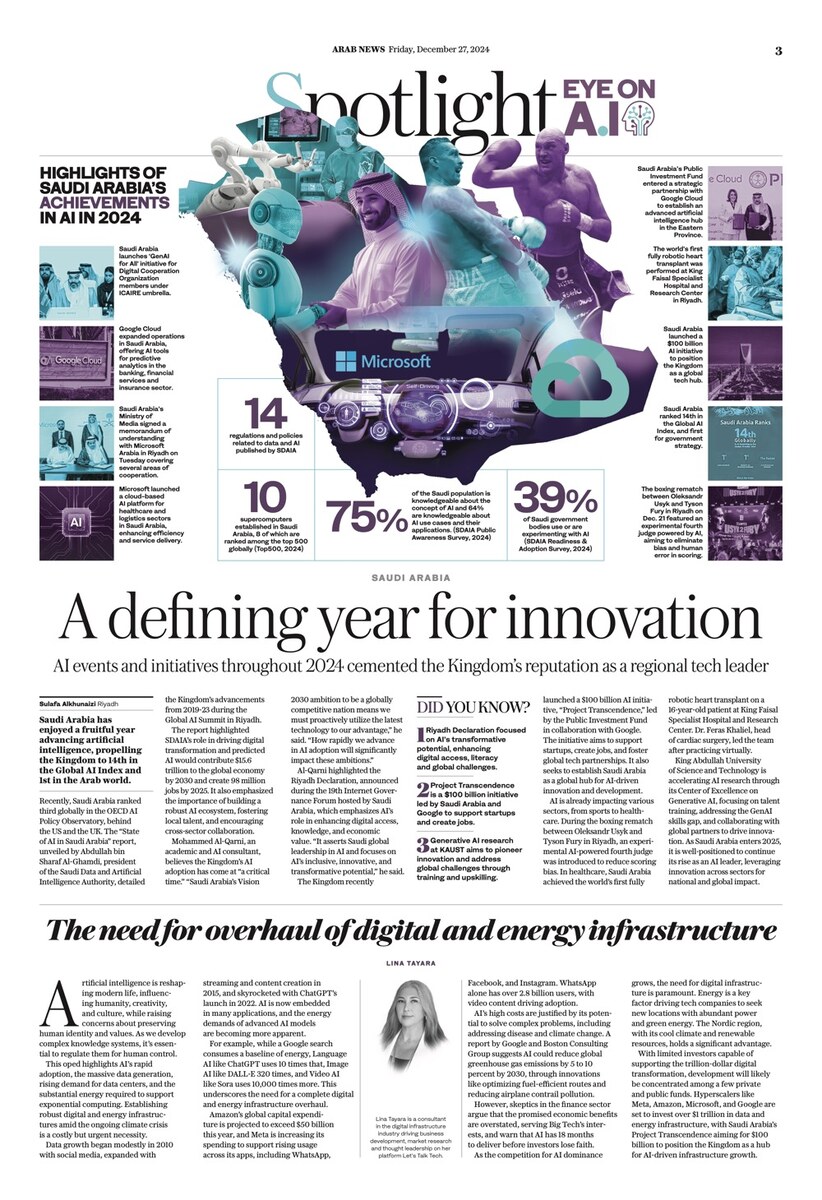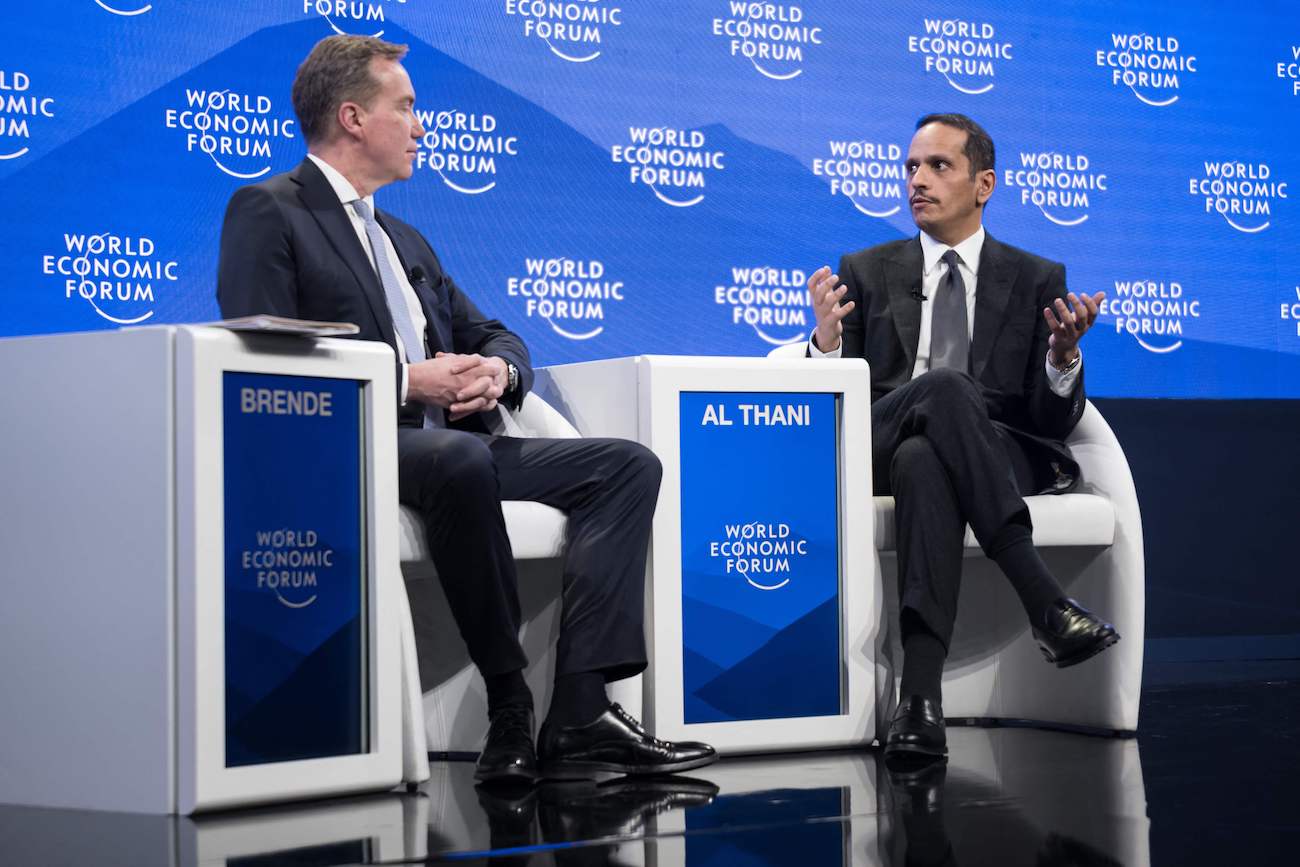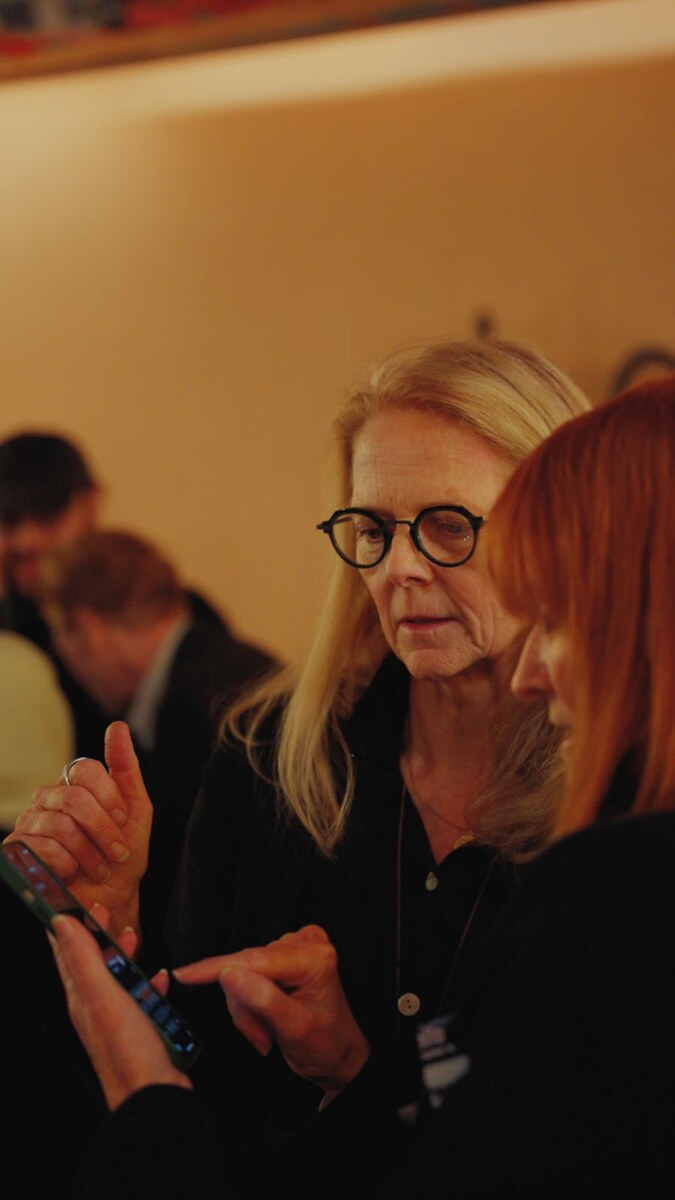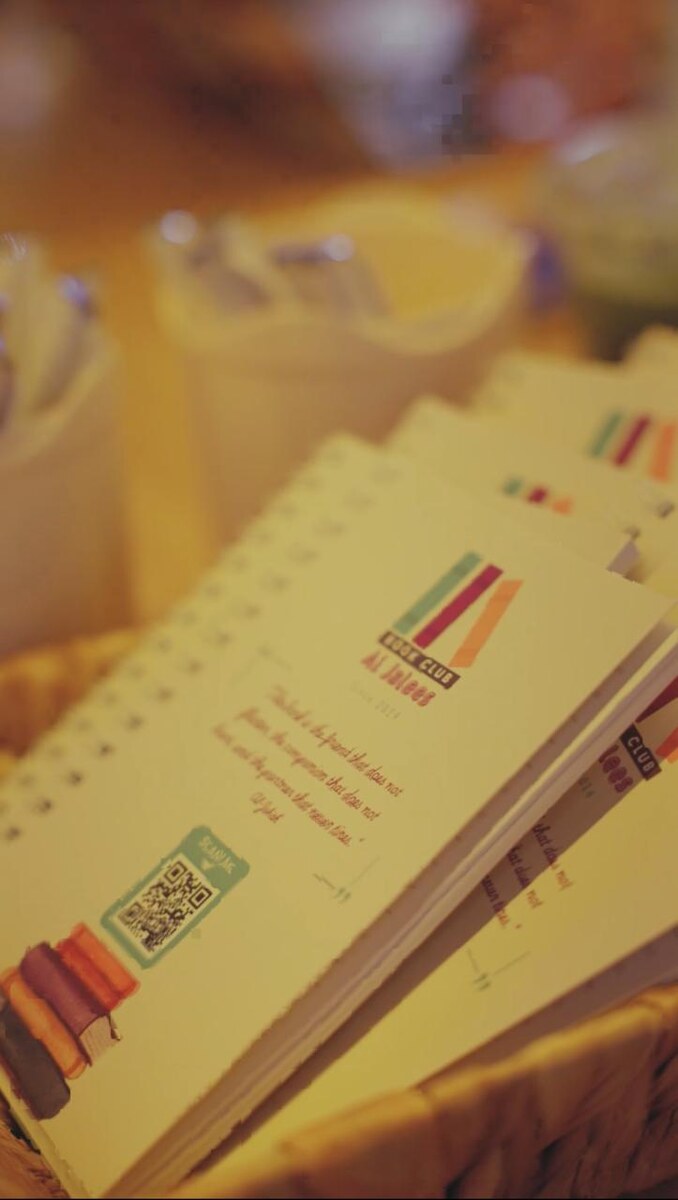RIYADH: Saudi Arabia has enjoyed a fruitful year of events and initiatives intended to advance the adoption of artificial intelligence, propelling the Kingdom to the 14th position in the Global AI Index and 1st in the Arab world.
Recently, Saudi Arabia was also ranked third globally in the Organization for Economic Co-operation and Development’s AI Policy Observatory, behind the US and the UK. But how did the Kingdom rise to such heights?
The “State of AI in Saudi Arabia” report, unveiled by Abdullah bin Sharaf Al-Ghamdi, the president of the Saudi Data and Artificial Intelligence Authority, detailed the Kingdom’s advancements from 2019-23 during the Global AI Summit held in Riyadh in September.
The report provided a comprehensive overview of the Kingdom’s progress in AI, focusing on seven key pillars: regulations and policies, investment, infrastructure, data, talent development, research and innovation, and adoption.
It also highlighted the Saudi Data and AI Authority’s central role in driving the Kingdom’s digital transformation. According to SDAIA’s forecasts, AI is expected to contribute SR58.8 trillion ($15.6 trillion) to the global economy by 2030 and create 98 million jobs by 2025.
Mohammed Al-Qarni, an academic and consultant on AI for business, believes the rapid pace of the Kingdom’s AI adoption has come at “a critical time.”
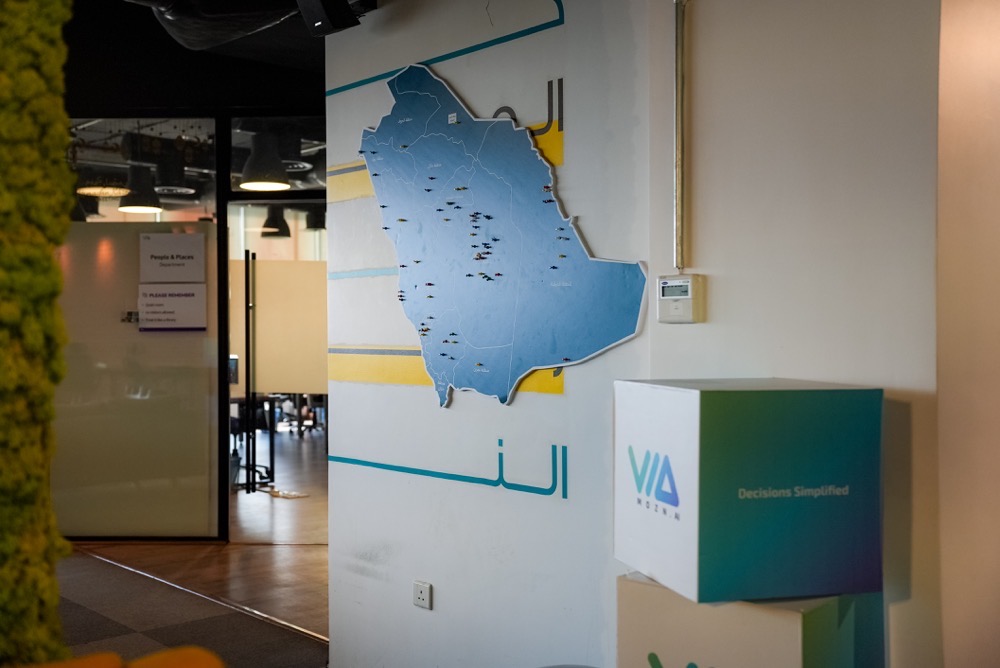
MOZN office in Riyadh. (Abdulrahman bin Shalhoub)
“It is now or never,” Al-Qarni told Arab News. “Saudi Arabia’s Vision 2030 ambition to be a globally competitive nation means that we must proactively utilize the latest technology to our advantage.
“Think of AI as a means to diversify the economy, another Vision 2030 ambition, or to develop globally competitive citizens.
“How rapidly we advance in AI adoption will significantly impact these ambitions. That being said, I think there is a long way to go. As AI is still developing, we must be agile to shape its future, whether in governance and ethics, technical development, or its impact on human lives.”
Al-Qarni said the most impressive advancement in 2024 was the Riyadh Declaration, a document announced during the 19th session of the Internet Governance Forum, hosted by Saudi Arabia and organized by the UN.
According to the Saudi Press Agency, the declaration focuses on AI with its inclusive, innovative, and impactful dimensions and emphasizes the need for using AI technologies to enable digital access, enhance digital knowledge, address global challenges, and unlock economic value.
Opinion
This section contains relevant reference points, placed in (Opinion field)
“It asserts Saudi global leadership in AI and focuses on AI’s inclusive, innovative, and transformative potential,” said Al-Qarni.
“The Declaration highlights the importance of leveraging AI technologies to expand digital access, enhance digital literacy, tackle global challenges, and unlock significant economic value worldwide.”
He added: “Nations that embrace AI will win, and those who let fear of AI get the best of them will lose.

Smart Citizens actively embrace AI-powered technologies in luxury apartments and homes. (Supplied)
“Globally, the next few years will offer as much opportunity as risk. Saudi Arabia has shown that it would be in the first camp. I expect more investment in human capital and technology. I also expect regulations to mature over the next few years, and I hope those regulations will more effectively support AI innovation and adoption.”
The past 12 months have seen a flurry of AI investment activity. The Kingdom recently launched a $100 billion AI initiative, named “Project Transcendence,” to position itself as a global tech hub.
The project, led by the Public Investment Fund in collaboration with Google, aims to support local tech startups, create jobs, and collaborate with technology firms globally.
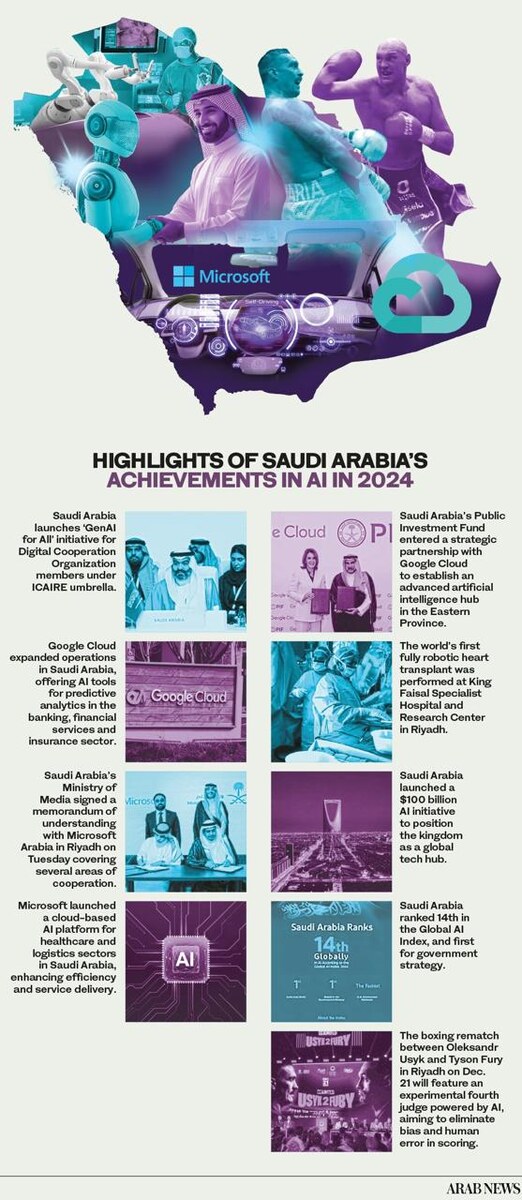
From fashion to sports, AI is already being utilized in almost every sector imaginable. The boxing rematch between Oleksandr Usyk and Tyson Fury in Riyadh on Dec. 21 featured an experimental fourth judge powered by AI, designed to help eliminate bias and human error in scoring.
Technology that supports good sportsmanship has also extended to the digital realm. FACEIT, a platform that uses Minerva, employs specialized AI technology to understand in-game actions and other non-text chat behaviors to improve multiplayer gaming experiences.
DID YOU KNOW?
• The Riyadh Declaration focused on AI’s transformative potential, enhancing digital access, literacy, and addressing global challenges.
• Project Transcendence is a $100 billion initiative led by Saudi Arabia and Google to support startups and create jobs.
• Saudi achievements in the health sector include the world’s first fully robotic heart transplant at King Faisal Specialist Hospital in Riyadh.
• Generative AI research at KAUST aims to pioneer innovation and address global challenges through training and upskilling.
Saudi Arabia’s health-tech sector is also undergoing a major transformation driven by AI, promising significant economic and operational benefits. A McKinsey & Co. analysis forecasts that by 2030, AI could unlock $15 to $27 billion in economic value for the Kingdom’s medical sector.
The Saudi health sector has made significant strides thanks to AI, such as the world’s first fully robotic heart transplant performed on a 16-year-old patient suffering from end-stage heart failure at King Faisal Specialist Hospital and Research Center in Riyadh.
A medical team led by Dr. Feras Khaliel, head of cardiac surgery and director of the Robotics and Minimally Invasive Surgery Program at KFSHRC, performed the operation after practicing the procedure virtually.
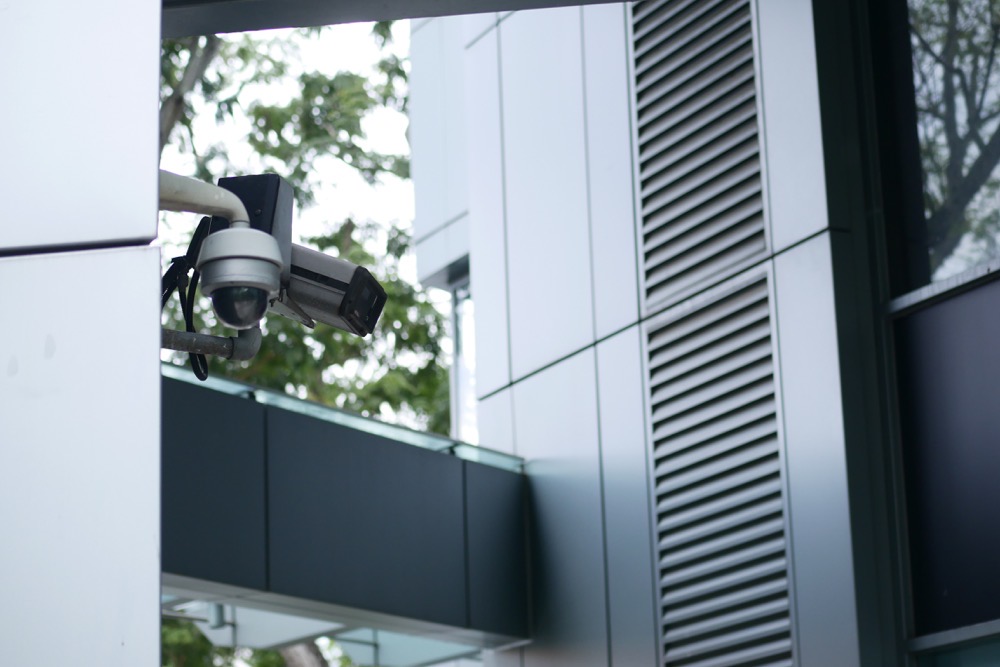
These solutions have already shown results with a 40 percent decrease in false alarms. (Supplied)
Saudi Arabia’s King Abdullah University of Science and Technology has also joined the global AI race by accelerating generative AI research through models aligned with the Kingdom’s Research Development and Innovation Authority.
Its Center of Excellence on Generative AI (GenAI Coe) intends to become the premier hub for pioneering generative AI technology to address the most pressing challenges faced by the Kingdom and the world.
The GenAI CoE also intends to focus on making a positive impact through GenAI training and upskilling programs for KAUST researchers, partners, and the general public. Through these training outreach initiatives, the CoE hopes to address the shortage of GenAI talent in Saudi Arabia.
As the Kingdom enters 2025, it is well-positioned to continue its meteoric rise as an AI leader.
